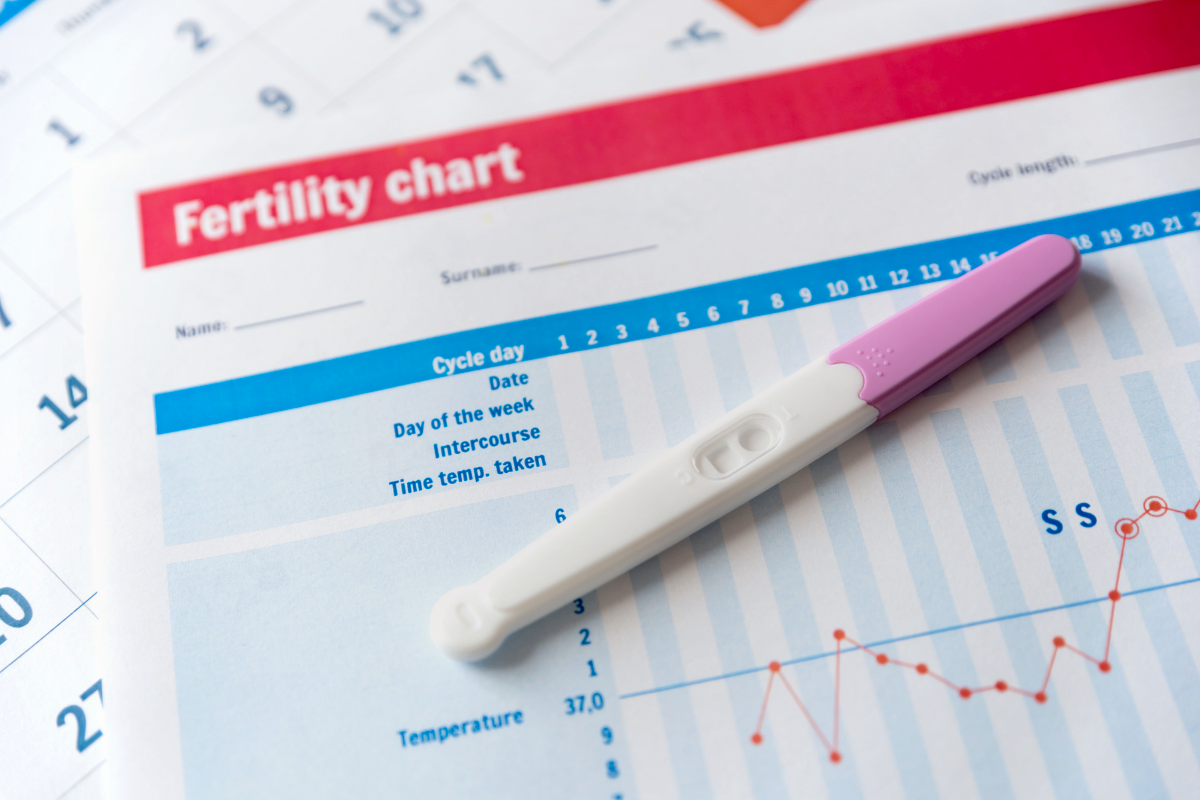It’s so clichéd that stress impacts your ability to get pregnant that any mention of difficulties is met with at least one unsolicited “Just relax and it’ll happen.” For most people, there is nothing that makes you less relaxed than someone telling you to do so.
Going through fertility treatments, especially if you have infertility, is inherently stressful. Emotionally, it can feel intense, isolating, and unpredictable. On top of that, the financial burden, time commitment, and logistics all take a toll.
So it’s not surprising that mental health conditions such as anxiety and depression have been estimated to affect up to 80% of heterosexual couples with infertility. One study even found that women with infertility experienced similar levels of distress as women diagnosed with cancer.

Instead of clichés, let’s take a look at what the data actually says:
- How does stress impact your fertility?
- How can you care for your mental health?
- How do SSRIs impact fertility?
If you are feeling stressed or struggling with your mental health, hopefully this information can help you feel more informed and get the support you need. You can find resources about mental health and more, here.
How does stress impact fertility?
It makes sense that we all assume that stress causes infertility. For one thing, stress has a negative impact on the function of the reproductive system: there is a well-established link between stress and delayed puberty in girls and absent periods (as in female athlete triad syndrome). But when it comes to fertility, we really don’t have a clear answer from the data about what effect, if any, stress has.
One idea is that stress may cause changes in the functioning of the hormonal and immune systems in such a way that decreases fertility and/or negatively impacts fertility treatment. But this has not been well established.
There is also the thought that stress causes behaviors that may hinder fertility. For example, stress can cause you to have a lower sex drive and get less sleep, and it can change your eating pattern, which in turn can alter your menstrual cycle. But all of this quickly becomes a sort of chicken-and-egg scenario: is it the infertility that causes all of this in the first place, or is it the stress that causes the infertility?
There are a couple of factors that complicate this. For one, as already mentioned, the things often required to treat infertility are stressful. So the majority of studies looking at stress and infertility are going to be biased by this fact, especially because most studies are looking at people who have sought treatment for infertility.
Another challenge is how stress is defined. Broadly speaking, stress is an internal state that differs from one’s “normal” state in response to something (aka the stressor) that is usually threatening. The body reacts in such a way as to respond to the stressor and (hopefully) restore the normal state.
But the details matter here. Different stressors are, well, different, and act via various mechanisms. For example, if we go back to puberty for a minute, the data on the impact of stress on puberty delay is centered around physiological stress — like poor nutrition and excessive exercise — rather than psychological stress, like a difficult day at work or a romantic breakup.
And then there’s the question of equivalency: is a difficult day at work really the same as a romantic breakup? What about the stress from discrimination? How would you measure any of it? None of this is standardized (though there are some validated measures of psychological stress), and many of the studies evaluating stress and fertility rely on asking people directly about their own experiences of stress and/or the number of stressful events.
The majority of the studies on stress and infertility are focused on outcomes during fertility treatments, namely IVF. Again, there isn’t a straightforward answer in the literature because of significant differences in how stress is measured and defined. Still, one of the best sources of data we have is this meta-analysis, which pools the results of 31 studies. The authors found that there was a small association between stress and worse chances of pregnancy with IVF. But they then hedge their conclusion by noting that the significant differences among the studies limit the conclusion.
Taking a step back, intentional or not, blaming stress as a cause of infertility falls into a long history of blaming women for their infertility. I also think that, consciously or unconsciously, many people are looking for something to point the finger at, especially something they think they have control over, because at least then control over our fertility seems to be within our grasp. The sad truth is that there is not much you can do to affect your fertility beyond avoiding smoking and stopping medications that can be harmful to a pregnancy.
How can you care for your mental health?
Even without clear evidence that stress causes infertility, it’s still true that seeking fertility support can be a stressful experience and many people benefit from mental health support. Comprehensive fertility care should include both mental and physical health treatment, and many fertility clinics have in-house mental health services. Whether or not you have a mental health diagnosis, you should be offered some form of mental health support. You can also search for therapists who specialize in infertility.
Multiple organizations offer support groups for individuals and couples with infertility or who are going through fertility treatments. RESOLVE is a national organization with a database for various support groups around the country. There are multiple organizations, too, that work with specific populations that face unique challenges with infertility and/or fertility treatment, such as Black women and queer people. Local fertility clinics may offer support groups as well, and you don’t always have to be patient at that particular clinic to join.
Finally, consider discussing your fertility journey with people in your life. Friends, family, and coworkers can all be amazing sources of support, especially those who have been through a similar experience.
How do SSRIs impact fertility?
One of the most common treatments for depression and anxiety are selective serotonin reuptake inhibitors (SSRIs). While older research suggested that these medications have a negative effect on fertility, newer studies have not found an association.
This review article looks at 20 such recent studies and found that, overall, there isn’t enough evidence to be concerned. Although three of the studies included in this review showed a trend toward a reduced chance of pregnancy with SSRIs, it is important to note that any potential negative impact of SSRIs must be weighed against the risks of untreated depression and anxiety.
It is also the case that some people experience a decreased sex drive while on SSRIs. Having sex less frequently within your fertile window could mean a lower chance of conception, so if this is something you’re concerned about, it’s worth bringing up to your mental health care provider.
The bottom line
- There is not enough data to show that stress negatively impacts fertility, and the overall quality of data that does exist is poor.
- Regardless of your fertility goals, it is beneficial to get treatment for mental health conditions or if you are experiencing distress.
- There are multiple organizations that offer support for people experiencing infertility.
- There is not enough data to suggest that SSRIs have a negative effect on fertility, although SSRIs can decrease your desire to have sex.
We recognize that readers of ParentData identify in different ways — read more about our approach to gender-inclusive language here.
Community Guidelines












Log in